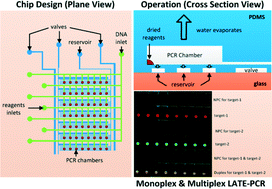Construction of a microfluidic chip, using dried-down reagents, for LATE-PCR amplification and detection of single-stranded DNA
Abstract
LATE-PCR is an advanced form of non-symmetric PCR that efficiently generates single-stranded DNA which can readily be characterized at the end of amplification by hybridization to low-temperature fluorescent probes. We demonstrate here for the first time that monoplex and duplex LATE-PCR amplification and probe target hybridization can be carried out in double layered PDMS microfluidics chips containing dried reagents. Addition of a set of reagents during dry down overcomes the common problem of single-stranded oligonucleotide binding to PDMS. These proof-of-principle results open the way to construction of inexpensive point-of-care devices that take full advantage of the analytical power of assays built using LATE-PCR and low-temperature probes.


 Please wait while we load your content...
Please wait while we load your content...